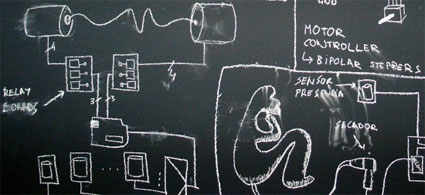
I’m off to Medialab-Prado where I’ll be participating in the Garage Science, their International Workshop-Seminar that includes an intensive project development workshop (January 28 through February 14, 2009) and a seminar with lectures and public theoretical works presentations (January 28 and 29, 2009). Both the projects and papers have been selected through international open call. I’ll be attending as an instructor/tutor/participant for this last week of the event.
This event is something near-and-dear to the Near Future Laboratory. Garage Science is about the socialization of technoscience along the vector of doing-it-yourself. Whereas most conventionally, things like science and technology are left to the big shots with bloated budgets and too much formal education, it is no longer possible to ignore what the networked society has allowed — people are creating knowledge on their own, circulating it at such a pace that it becomes possible that technoscience is happening in places other than the cordoned-off laboratories and billion euro cyclotrons.
It should not be a surprise that smart people with the will to create new things are doing so. They may have always been, but the networks allow them to find their fellow explorers, share knowledge, encourage one another, learn the bits they need to know — all in their garage, with a bit of kit found on Ebay, low cost equipment and computers and microcontrollers, etc. This is quite a new thing, and is plainly a weak signal of a shift in who plays what part in the production and circulation of ideas. It’s a new knowledge-culture we’re in.
The socialization of technology and the accessibility of information available on the Web make it increasingly easy for anyone to have the possibility of building a home laboratory. Garage science is nothing new but home laboratories are connected now more than ever before. There are home laboratories of all kinds: technology factories, chemistry or biology labs, artists’ studios, places to rehearse, etc.
These home laboratories have a worldwide scope via the Web, which serves as a space for the dissemination of projects and the exchange of knowledge and techniques. These online communities are accompanied by a proliferation of onsite events, such as dorkbots, barcamps and hackmeetings, where people who only knew each other via the Web can meet face to face and share their achievements and experiences.
The communities formed this way provide citizens with the capacity to develop scientific-technical knowledge comparable to what is produced in the major laboratories. “Citizen science” can serve to explore questions such as: How are the foods we eat made? What possibilities exist in biogenetic research? What is the code that makes the machines we use work? How are those machines manufactured? Based on this knowledge, experimental and critical formulations and objects can be produced proposing new paths and goals in these fields.
Interactivos?’09 aims to explore these practices, where art, science and technology meet. We invite the participants to turn medialab into a garage laboratory where low-cost, accessible materials are used to develop objects and installations that combine software, hardware and biology. There’s license to fail!